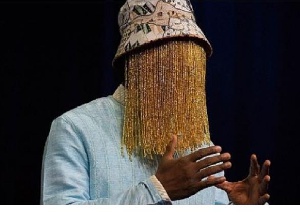Watching Anas Aremeyaw Anas’ exposé on the shameless quackery that makes Ghana’s battle against the COVID-19 pandemic no easier, I was disappointed. The sequel would follow in a couple of weeks, he says, but I’m sure I’d be left crestfallen again.
And why not?
Ever since the pandemic struck Ghana — a steady trickle at first, but now an overwhelming deluge — I’ve been wondering just how Anas, a man who already hardly goes anywhere unmasked, would manage to strap one of ’em face-masks to the veil of beads that decorates his facade of invisibility and mystery. My imagination had been wild at work, throwing up fanciful combinations, and only slightly tamed when Anas announced the imminent release of his latest work.
So I downloaded it from YouTube on Monday night — Internet Download Manager is such an understated blessing, charley — and treated myself to it for nearly half-an-hour, glass of fresh yoghurt in hand. In the end, the only thing I truly enjoyed was the drink; nothing else went down well — not the heart-rending and potentially life-threatening display of human greed Anas captured so vividly on hidden cameras, nor the fact that Anas never simultaneously wore both masks at any point in the video.
My biggest disappointment, though, is the public response to Anas’ fresh offering: apathetic, at best, or altogether dismissive. The consensus, it seems, is that no Anas video is worth watching unless we have to queue up for it in our thousands and/or it names and shames some corrupt leaders. Actually, I enjoy those, too, and find them deeply satisfying. It’s human nature, I guess.
Suspicion of wrongdoing in the corridors of power, and society’s general distrust of the establishment, makes us long for any semblance of proof that would appear to vindicate our deeply entrenched beliefs. Over the years, Anas has given us plenty of that, rocking the very foundations of some of our most formidable institutions with his daring undercover missions. In 2018, he triggered the collapse and subsequent overhaul of our football system; three years prior, we had heard the scales of justice creak from the sheer weight of cash, goats, and yam.
Now that, to us, is success.
Not to Anas, though.
“Journalism is not Concert Party,” he told this writer on Tuesday, when his ‘Corona Quacks’ documentary began to make headlines.
“For me, it’s about impact, and how it affects society. Take a look at the Food and Drugs Authority statement after my exposé, and the impact is felt loud and clear. That’s journalism — and that’s how I measure success.
“This project would certainly put quack doctors on the lookout. It would further enlighten people about the dangers of resorting to unverified quack medicines. That is what we call impact!”
“Yeah right,” I muttered, “but I’m still mad about you not wearing the face mask on top of . . .”
Never mind; that was just me thinking, but the thought quickly drowns in the sea of sense his point made. And, really, who are we to define just what success in Anas’ risky business is, when it’s he who puts his life on the line and invests considerable resources to get it done?
Pardon the headline of this article, then; the problem, perhaps, is with us — not Anas. It is our insatiable craving for the sensational — which is probably why you were lured unto this page in the first place, right? — and an unhealthy appetite to see big guys stripped bare in Anas’ blockbusters that ultimately let us down. But Anas doesn’t promise to deliver stories that would make us ooh and aah. What he pledges — and has, indeed, consistently delivered — is journalism that touches hearts and changes lives.
He isn’t missing the point; we are. Our obsession shouldn’t be with how many top officials get their careers obliterated by Anas’ prying eyes, no matter how good that feels. The culprit might not always be a Dery or a Nyantakyi. Sometimes, it’s an Abdellah — one of us — and, all the time, it’s about how much good society reaps when the dust settles.
And if you don’t find that deeply satisfying, too . . . well, why the heck have you read down to this last question mark?
Opinions of Thursday, 2 July 2020
Columnist: NY Frimpong



















